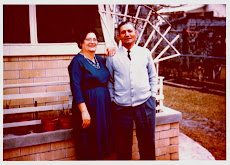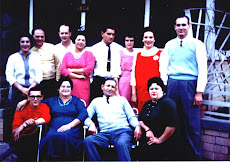The enduring popularity of bakalar is a bit of a mystery to me. I am not a picky eater, but I could never get past the stinky smell of the cooking cod to actually taste it (not even when I visited Croatia) though I hear it is quite delicious. It is amazing to me that a fish that originates from the North Sea is so popular along the Adriatic and the Northern Gulf of Mexico, areas both known for their excellent indigenous seafood. Blame it on the Venetians and their trade routes.
The dried salted cod for bakalar must be ordered well in advance of Christmas, soaked for hours and pounded to a pulp to soften it. The fish is cooked down along with potatoes, bay leaves and other seasonings to make a thick stew. My grandfather used to put raisins in his bakalar, a touch you'll often find in North African versions of the dish, but no one else I know of on the Point did that. To see photos of bakalar (both cooked and pre-cooked), visit this site.
And then there was the singing.
Midnight Mass at St. Michael's was always packed and afterward, the Croatian men of Point Cadet would begin their rounds of visits, singing a cappella in Croatian at each house and lingering for a shot of whiskey or homemade grappa, freshly fried pusharates, bowties slices of strudel before moving on to the next house.
Aunt Frances' husband, Uncle Frank, was not Croatian but always accompanied the group to hum background harmony. About half-way through their rounds, after a few belts of the hard stuff, he gave up humming and began singing along in Croatian-sounding gibberish. No one seemed to notice or care.
Not surprisingly, many of the singers enjoyed a Christmas breakfast of Alka Seltzer.
I've often wondered if these customs, which traveled to Biloxi with our immigrant ancestors in the late 19th and early 20th centuries, were still alive and well in Dalmatia.
You'll find the answer here and here. I should have known. Traditions this good just never die.
So no matter where your family comes from or where you live now, Sretan Bozic i Nova Godina (Merry Christmas and a Happy New Year) from Mike and Mary's Kitchen.


 Uncle Raymond was a big guy right from the start -- a whopping 12 pounds when he was born. His birth reportedly was a long, difficult one, and when he didn't draw breath, the attending physician (he was born at home as were most babies back then), declared a stillbirth.
Uncle Raymond was a big guy right from the start -- a whopping 12 pounds when he was born. His birth reportedly was a long, difficult one, and when he didn't draw breath, the attending physician (he was born at home as were most babies back then), declared a stillbirth. 
 Wiping away tears, he packed a few treasured toys into a box and went out to Old
Wiping away tears, he packed a few treasured toys into a box and went out to Old 
